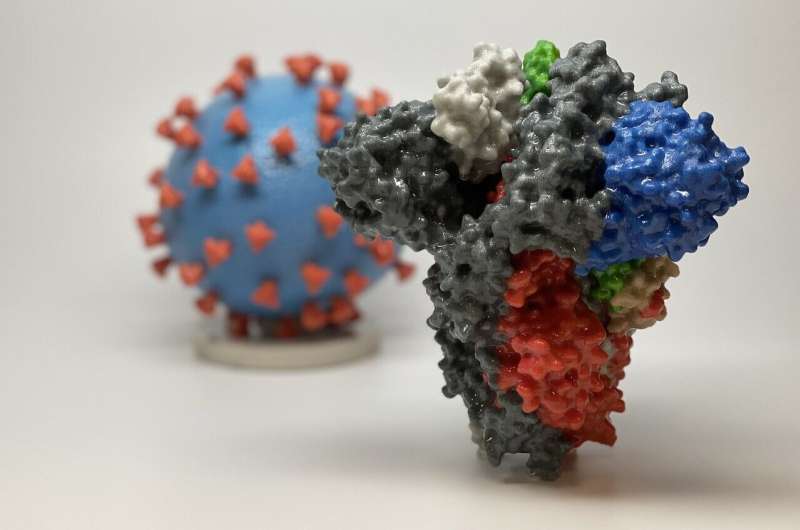Why are some COVID cases more severe than others? 'Humanized' mice offer a clue

Why do 80 to 90% of people infected with COVID-19 experience only mild cases while 10 to 20% face more severe or life-threatening symptoms?
Researchers in the lab of Yale's Richard Flavell decided to pose this question to a mouse, or rather to mice they have engineered to possess human-like immune systems.
These "humanized mice" revealed that the causes of severe COVID may lie in our own antiviral inflammatory response to the virus, the researchers report Dec. 17 in the journal Nature Biotechnology.
The study also showed that two well-known therapies—the use of monoclonal antibodies and the steroid dexamethasone—can help treat COVID-19 infections. But in the case of the antibodies, treatment is only effective if administered early in the course of disease. In the case of steroids, it's only effective if administered during later stages of the disease.
The different immune system responses to the virus as observed in standard laboratory animals and humans has made it difficult for scientists to pinpoint the tipping point between mild and severe cases of COVID-19. But Flavell's mice, which were engineered to have a human-like immune system, offered an opportunity to answer the question.
"If you infect a standard laboratory mouse with SARS-CoV-2 they will get infected, but not get seriously ill," said Flavell, Sterling Professor of Immunobiology at Yale and senior author of the paper. "But our humanized mice get sick and just don't get better. Their whole immune system is on fire."
The research team—which was led by first author Esen Sefik, a Howard Hughes Medical Institute (HHMI) Fellow at the Damon Runyon Cancer Research Foundation—introduced SARS-CoV-2 virus taken from seriously ill human patients into the nasal passages of their humanized mice and then followed the course of the disease.
They found that the infected mice exhibited the same symptoms as severely ill human patients, such as lung damage, weight loss, and a heightened, persistent inflammatory immune response that damages tissues. They then treated the mice with monoclonal antibodies provided by Michel Nussenzweig, an immunologist at Rockefeller University and, like Flavell, an HHMI investigator. These antibodies, which specifically target the virus, were effective if given before or very early after infection but did little to stifle symptoms if administered in later stages of infections, they found.
Conversely, during the early stages of infection the immune suppressant dexamethasone was fatal to mice when it suppressed the initial immune response that was crucial to combat the virus. However, it helped clear infection during later stages of disease by suppressing the inflammatory response that had begun damaging organs.
"Early in the course of disease, a strong immune response is crucial for survival," Sefik said. "Later in the disease, it can be fatal."
The humanized mice models might also reveal strong clues to the causes and potential treatments of so-called long and severe COVID, the scientists said.
The research was done in collaboration with Yale's Akiko Iwasaki, Craig Wilen, Yuval Kluger, Eric Meffre, and Stephanie Halene.
More information: Esen Sefik et al, A humanized mouse model of chronic COVID-19, Nature Biotechnology (2021). DOI: 10.1038/s41587-021-01155-4




















